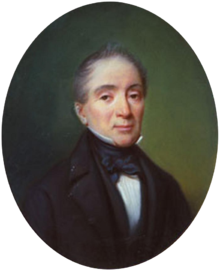Florestan I
| Florestan I | |||||
|---|---|---|---|---|---|
 |
|||||
| Prince of Monaco | |||||
| Reign | 2 October 1841 – 20 June 1856 | ||||
| Predecessor | Honoré V | ||||
| Successor | Charles III | ||||
| Born |
10 October 1785 Paris, France |
||||
| Died | 20 June 1856 (aged 70) Paris, French Empire |
||||
| Burial | Saint Nicholas Cathedral | ||||
| Spouse | Maria Caroline Gibert de Lametz | ||||
| Issue |
Charles III, Prince of Monaco Florestine, Duchess of Urach |
||||
|
|||||
| House | Grimaldi | ||||
| Father | Honoré IV, Prince of Monaco | ||||
| Mother | Louise d'Aumont | ||||
| Full name | |
|---|---|
| Tancrède Florestan Roger Louis Grimaldi |
Florestan I, Prince of Monaco (10 October 1785 in Paris – 20 June 1856) was Prince of Monaco and Duke of Valentinois from 2 October 1841 until his death. He was born Tancrède Florestan Roger Louis Grimaldi the second son of Prince Honoré IV and Louise d'Aumont Mazarin and succeeded to the throne on the death of his brother, Honoré V.
Brought up by his mother, he showed an early and strong aptitude for literature. At the age of eleven, he enrolled in the School of Fontainebleau, but did not stay there long. He entered the military, where he had many struggles and barely achieved the rank of Corporal. He was taken prisoner during the French invasion of Russia. He was not freed to return to France until 1814.
Prince Florestan, age 29, married (Marie) Caroline Gibert de Lametz in Commercy on 27 November 1816. Apparently, his family disapproved of the union, so they had to marry "quietly and modestly." Florestan received only a small income from his family, so, as it turned out, his marriage to a descendent of one of the old families of Champagne (province) was, in fact, "financially favorable."
The marriage produced the following:
Florestan was ill-prepared to assume the role of Sovereign Prince. He had been an actor in the Théâtre de l'Ambigu-Comique. The real power during his reign lay in the hands of his wife, Princess Caroline, who possessed great intelligence and "excelled at social skills." According to the historian Gustave Saige, Princess Caroline's intelligence was required to figure out the affairs of state, which Honoré V had handled absolutely by himself, not trusting anyone to advise or assist him. For some time, she was able, by tax reform, to alleviate the difficult economic situation stemming from the Congress of Vienna assigning Monaco as a protectorate of the Kingdom of Sardinia rather than France.
...
Wikipedia
